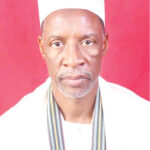Youths participation in the democratic process can only improve the quality of democracy if the youth are adequately informed, exposed and prepared for public office, the Presidential Adviser on Social Protection Plan, Mrs. Maryam Uwais, has said.
She spoke at the 16th Daily Trust Dialogue held in Abuja on Thursday.
Uwais said the Nigerian youths must adopt a knowledge-driven approach to spur economic development.
She said the youths should not be deterred by the high cost of campaign spending and godfatherism.
The presidential aide said as shown in the 2015 elections, young people intensified their engagement with public officials and their representatives who prior to 2015, seldom communicated with their constituents.
“The youths not only campaigned vigorously for preferred candidates, but they also acted as watchdogs, election workers (INEC-recruited as ad-hoc), anti-corruption crusaders, civil society and social media activists,” she said.
She said these avenues opened up a two-way communication line between our young citizens and elected officials, that persists, till today.
“Difficult questions are still being asked, corruption being unearthed and human rights violations exposed, on a regular basis.
“Digital activism has significantly increased over the years as an alternative mode of political participation.
“Social media not only increased youth participation in civic affairs, social and environmental issues, accountability has also been promoted in an unprecedented manner,” she noted.
Uwais said youth participation in governance is a global phenomenon with only two percent of lawmakers across the world under 30 even though 30 percent of the world population is under the age of 30.
“The social investments schemes of President Muhammadu Buhari are targeted at developing the economic and human capital of the youths,” she said.
She said through the N-Power programme alone, 500,000 graduates and 20,000 non-graduates have benefited.
She said over 1.3 million Nigerian youths, over 46 percent of them below the age of 35, have benefited from the NSME schemes.

 Join Daily Trust WhatsApp Community For Quick Access To News and Happenings Around You.
Join Daily Trust WhatsApp Community For Quick Access To News and Happenings Around You.


